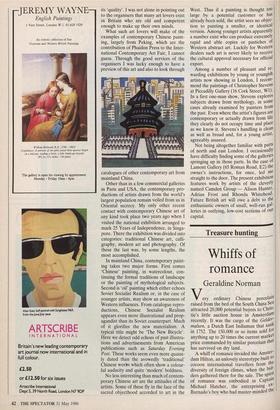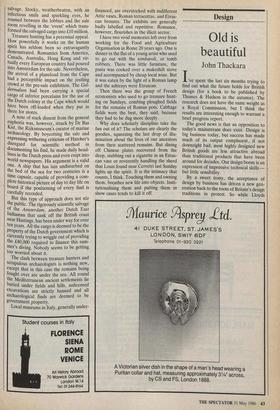Treasure hunting
Whiffs of romance
Geraldine Norman
Very ordinary Chinese porcelain raised from the bed of the South China Sea attracted 20,000 potential buyers to Chris- tie's little auction house in Amsterdam recently. It was the cargo of the Gelder- malsen, a Dutch East Indiaman that sank in 1752. The 150,000 or so items sold for anything up to 20 times the current market price commanded by similar porcelain that has survived on dry land. A whiff of romance invaded the Amster- dam Hilton, an unlovely stereotype built to cocoon international travellers from the diversity of foreign climes, when the bid- ders gathered there for the sale. The spirit of romance was embodied in Captain Michael Hatcher, the enterprising ex- Barnado's boy who had master-minded the
salvage. Stocky, weatherbeaten, with an infectious smile and sparkling eyes, he roamed between the lobbies and the sale room revelling in the 'event' which trans- formed the salvaged cargo into £10 million.
Treasure hunting has a perennial appeal. How powerfully it works on the human spirit has seldom been so extravagantly demonstrated. Romantics from America, Canada, Australia, Hong Kong and vir- tually every European country had poured into Amsterdam for the sale. Nevertheless, the arrival of a planeload from the Cape had a perceptible impact on the jostling crowd at the pre-sale exhibition. The Gel- dermalsen had been carrying a special cargo of inferior porcelains for the use of the Dutch colony at the Cape which would have been off-loaded when they put in there for stores.
A note of stark dissent from the general euphoria was, however, struck by Dr Bas Kist, the Rijksmuseum's curator of marine archaeology. By boycotting the sale and expressing withering criticism of Hatcher's disregard for scientific method in documenting his find, he made daily head- lines in the Dutch press and even crept into world newspapers. His argument is a valid one. A ship that has lain undisturbed on the bed of the sea for two centuries is a time capsule, capable of providing a com- plete historical picture of day to day life on board if the positioning of every find is carefully recorded.
But this type of approach does not stir the public. The rigorously scientific salvage of the Amsterdam, another Dutch East Indianian that sank off the British coast near Hastings, has been under way for over ten years. All the cargo is deemed to be the property of the Dutch government which is currently trying to wriggle out of providing the £40,000 required to finance this sum- mer's diving. Nobody seems to be getting too worried about it.
The clash between treasure hunters and scrupulous archaeologists is nothing new, except that in this case the remains being fought over are under the sea. All round the Mediterranean ancient settlements lie buried under fields and hills, unlicensed excavations are strictly banned and all archaeological finds are deemed to be government property.
Local museums in Italy, generally under-
financed, are overstocked with indifferent Attic vases, Roman terracottas, and Etrus- can bronzes. The exhibits are generally badly labelled and repetitive. Romance, however, flourishes in the illicit sector.
I have two vivid memories left over from working for the Food and Agriculture Organisation in Rome 20 years ago. One is dinner in the flat of a young artist who used to go out with the tombaroli, or tomb robbers. There was little furniture, the pasta was cooked over a makeshift stove and accompanied by cheap local wine. But it was eaten by the light of a Roman lamp and the ashtrays were Etruscan.
Then there was the group of French economists who used to go treasure hunt- ing on Sundays, combing ploughed fields for the remains of Roman pots. Cabbage fields were the best, they said, because they had to be dug more deeply.
Why does scholarly discipline take the fun out of it? The scholars are clearly the goodies, squeezing the last drop of illu- mination about the lives of our ancestors from their scattered remains. But dining off Chinese plates recovered from the deep, stubbing out a cigarette in an Etrus- can vase or reverently handling the sherd that Louis found near Cervetri last Sunday lights up the spirit. It is the intimacy that counts, I think. Touching them and owning them, breathes new life into objects. Insti- tutionalising them and putting them in show cases tends to kill it off.



























































 Previous page
Previous page